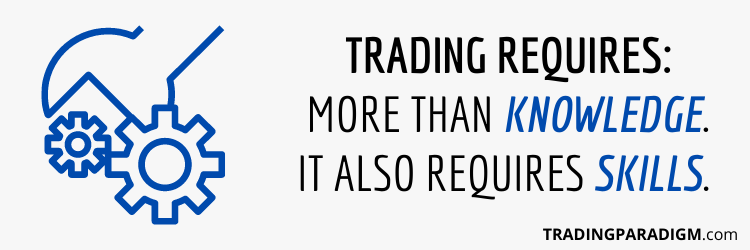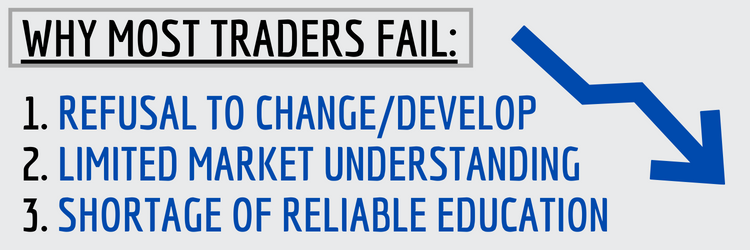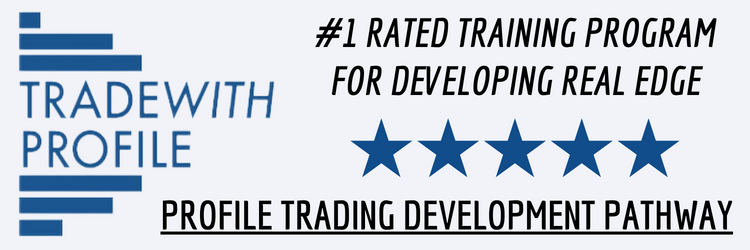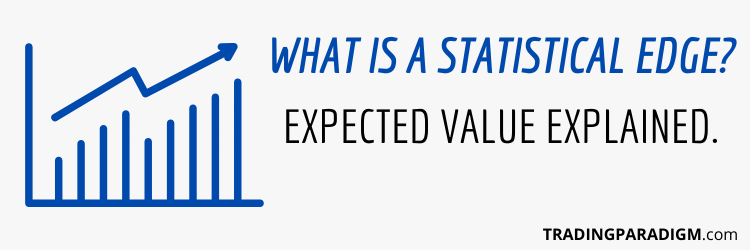Knowledge vs. Skill – Understand the Distinction Between Information and Functional Skill:
I fear that many hopeful traders become serial course-takers and service-subscribers (related to trading) due to a misunderstanding in what it takes to achieve durable success in the markets. They just don’t understand the difference between knowledge and skill.

Now, I’m not saying that all trading courses and services are bad – that’s not true at all. But what I am saying is that there’s a limit to how helpful they can be. Because at some point, the knowledge you acquire in a course or service has to be practically applied.
Simply reading a couple books or watching a few YouTube videos isn’t enough to turn you into a consistently profitable trader. Any information or knowledge that you obtain is all just theory. In other words, you have to do more in order to wire functional skills.
It’s the same as playing an instrument or sport. Simply watching a video of a professional musician playing a flawless trumpet piece or a professional athlete hitting a baseball over 4oo feet into the stands won’t magically make you be able to do these things.
Even if these professionals broke down their approach into steps and provided you with pointers, you still have put in the time and effort to turn that knowledge/information into skills. This can only be accomplished through deliberate practice and training.
Where Most Traders Go Wrong – Thinking They Can Arrive at Trading Success Intellectually:
Trading success is not necessarily about how smart or intelligent you are – it’s about executing on a statistical edge with discipline and consistency. This is why being a great market analyst doesn’t necessarily equate to being a great trader.
You can know all there is to know about technical and fundamental analysis, but if you can’t appropriately manage risk then none of that knowledge really matters. Eventually you’ll decimate your account by removing stops, adding to losers, and going against your plans.
This is where consistently profitable traders separate themselves from the pack. Not only do they understand technical/fundamental analysis, risk/money management, and trading mindset/psychology on a conceptual level – but a functional level as well.
It’s one thing to understand the importance of your rules and plans outside of market hours. But it’s a completely different story following them in-the-moment while the market is constantly shifting around – in many cases against your current position(s).
The bottom line is that successful traders have a sufficient level of knowledge in relation to trading terminology and concepts. But their success is a result of much more than that – it’s the development of legitimate technical, analytical, and mental skills.
Acquiring Both Knowledge AND Skill is the Benefit of a High-Quality Trading Course/Program:
I hear the argument all the time in relation to trading courses/programs that: “you can find all of the same information from the course for free online.” But again, you have to understand that information alone isn’t the determining factor in success.
#1 Training Program For Skill & Edge Development → THE PROFILE TRADING DEVELOPMENT PATHWAY
You can find pretty much any information you want for free these days through Google and YouTube. It might take a little more digging and sifting through multiple sources (a course can provide more organization/structure), but free information is available.
The problem with this free approach is that you don’t necessarily know if the information is accurate, and it also lacks individual coaching/mentorship – which offers the benefit of fast, personalized feedback for accelerated skill-building and improvement.
I do agree that there are many low-quality trading courses out there that don’t teach much more than basic technical analysis or offer any sort of 1-on-1 mentorship opportunities – I’m not arguing that. But there are still a handful of solid programs out there.
The bottom line is that no course or program (at least in my experience) offers any sort of magical information/knowledge – like the foolproof/holy-grail systems that people are always chasing. The real key to trading success is in experience and skill-building.
Good Trading is a Skill-Based, Peak-Performance Endeavor – It’s Not Gambling:
Many market participants treat trading like gambling – acting randomly/irrationally based on emotions/impulses. But that’s not what good trading is all about. Good trading is about thinking probabilistically, having a long-term focus, and executing with consistency.
If you take a casino, for example, the typical casino patron does not have the odds in their favor. Every single game (slots, roulette, etc.) is rigged in favor of the casino. It might seem like a slight/unnoticeable edge, but the casino isn’t really gambling at all.
Sure, a handful of patrons will walk away with winnings sometimes. But in the aggregate – the more rolls, spins, and hands that are played – the more the casino makes. This is why there are table limits and the common motto is “keep the players playing.”
When it comes to trading, you want to be like the casino (not the patrons). There’s certainly short-term risk due to variance (losses are unavoidable), but you win in the long-run if you continuously put the odds in your favor and appropriately manage risk.
At the end of the day, you need more than information to achieve durable success – you also need the functional skills to execute.
Learn More in the Trading Success Framework Course
Written by Matt Thomas (@MattThomasTP)
Related Pages:
- How to Get Started Trading With the Right Expectations
- Top 20 Trading Paradigm Tweets of 2021 – @MattThomasTP
- Why is Day Trading So Hard – The Realities of Day Trading
- Training For Day Trading – What is Training For Trading?
- Become a Consistently Profitable Trader – The Success Formula






I completely agree with your perspective that acquiring knowledge alone is not enough to become a consistently profitable trader. As someone who has taken several trading courses, I can attest to the fact that while they provide valuable information, it takes more than just knowledge to succeed in the markets.I have personally struggled with executing trades according to my plans and rules in the heat of the moment. It’s easy to get caught up in emotions and deviate from the plan, which has resulted in losses for me. However, I have also learned that deliberate practice and training can help develop the necessary skills to execute trades with discipline and consistency.I wonder if there are any specific training programs or mentorship opportunities that you would recommend for developing the necessary skills for successful trading?
Hi Akumendoh – thanks for sharing your thoughts!
To answer your question on specific education, training, and mentorship opportunities to acquire real skills & habits for sustainable success – I always recommend my Trading Success Framework Course and Trading Paradigm Skool Community. The Thinkific version of the Trading Success Framework course is no longer free, but the Trading Paradigm Skool Community does still offer a free version of it. The catch, however, is that it requires some interaction within the community to unlock all 4 sections of it (only the Introduction is immediately available). I recently made this change because I want to incentivize the asking of good questions, discovery of accountability partners, and sharing of things like trade plans & reviews (aka the actual work/process required to be a skilled, competent, self-sufficient trader); not just passive learning. So these resources are where I recommend new traders start in order to understand what being/becoming a consistently profitable trader truly entails (without the hype/flash that’s so prevalent in the industry). For potential next steps after that, I also recommend a small handful of top-notch training & mentorship programs that I have deep experience with and highly respect (from both a market methodology and mindset/psychology perspective). Pretty much every course/resource that I’ve created myself or have been through and recommend here on the TradingParadigm platform are largely focused on proper skill & habit-building because that’s what’s required for sustainable market success.
Without knowledge AND skill you can do nothing. You have to inform yourself and internalize concepts through various trainings. I believe you have to be active in your learnings – that helps a lot. These concepts were not very familiar to me either at the beginning, but I am learning something new every day.
Yes, Bojana – I completely agree. You need knowledge AND skills to perform at an elite level in anything – not just trading. Active learning with lots of repetition and accurate, constructive feedback is the key. Keep up the great work!
Hi Matt, I totally agree with your point. Just reading a few books and watching a few instructional videos will never help us achieve consistent profitability in trading, we must invest a much time and effort into deliberate practice to turn what we learn into skills.
To be honest, I lost a lot of money in Forex and Cryptocurrency trading in the past 1 year because I was reckless after simply watching a few YouTube videos. I’m too eager to make money.
You made me realize that I have mistakenly regarded trading as a gamble in the past. Reading through your article, I know that long-term stable profits are possible only if I keep my odds advantage and manage my capital and risk well.
Hi Julia – thanks for sharing your experiences!
Don’t get me wrong, I’ve read hundreds of books and watched thousands of YouTube videos (trading-related and not) – and I certainly believe many books and videos to be incredible learning resources. But many newcomers to the trading space don’t understand that the information/knowledge shared within these resources is only the starting point. From there, real habits, skills, and experiences need to be acquired. No book can keep up with the adaptations/adjustments you have to make within dynamic, ever-evolving markets. And no video can automatically bestow effective habits and skills upon you – you have to work hard in order to develop them for yourself. You can’t just read a book or watch a video on how to perform a surgery, for example, and then immediately be an expert at it. A base level of knowledge is ideal so that you’re not completely lost, but hours, days, weeks, months, and maybe even years of additional training and habit/skill-building is required in order to master it.
I think the problem stems from people wanting a fast, easy way to make money and thinking that there’s some magical answer to trading success – like a simple chart pattern (double top, cup and handle, head and shoulders, etc.) or mathematical formula that will produce automatic profits for all eternity. But that’s just not how it works – there’s much more to it than that. No simple pattern really has an edge all by itself. You have to understand the context surrounding it. What’s happening on higher time frames? Is there fresh news to consider? Are buyers/sellers respecting key price levels/zones? What’s happening on the tape/level 2? Answering all these questions (and more) and determining when situations fit your criteria to put on risk (and how much risk) is hard. But most people don’t want hard/difficult. They want simple/easy – yet also want simple/easy to generate millions of dollars. So those are the types of videos you get on YouTube – simple patterns that produce mega-profits (but it’s BS). Online platforms (especially social media) quickly turn things into entertainment (showcasing fancy cars and other lifestyle components) instead of actual substance (legitimate education/training/skill-building). It’s hard enough to become a great trader in the first place, but when you pile all the gimmicks, nonsense, and misrepresentations of what it takes to succeed on top of it – it makes it even harder.
I’m saying all this because I want people to get into trading with proper expectations, be willing to work hard from the start, and have a much higher chance of ultimately succeeding. But keep in mind that most individuals within the trading industry have no financial incentive to be this honest. For those who sell trading courses, programs, platforms, tools, and services – they have an inherent bias toward making trading seem easy/simple (so that they attract more people and sell more of their products/services). And I’m not saying that every single trading product/service out there is bad (that’s just not true at all), but being vocal about how hard the training process is doesn’t attract customers/subscribers/clients very well. As we just discussed, the masses want fast, easy money – and there’s no shortage of people willing to sell those dreams to them.
Personally, I’ve probably missed out on thousands of dollars in potential affiliate/referral/partnership/advertising income generated by my site because much of my content focuses on the hard work and training required to become a great trader – effectively scaring many people away from pursuing it (but that’s not my intention). I want everyone who visits my site and other channels to pursue trading (not just for the potential financial rewards, but the personal development as well), but I also want them to have proper expectations and be in the best possible position to succeed long-term. I apologize for this turning into a bit of a rant about the landscape of trading education/training and how most people respond to it, but I’m extremely passionate about this topic and hope these types of articles help people understand the realities of becoming a trader.
Again, thanks for your feedback – and if you have any additional comments/questions, never hesitate to share!
When I got started trading, I absorbed a lot of knowledge/information. But I quickly noticed that to become a successful trader, I needed much more. After months of trial and error, I discovered that I needed to translate what I had learned into skills. And that is why it’s so important to get our hands into the soil as soon as possible when we’re learning how to trade.
Yes – exactly, Paolo. But I don’t want people to confuse the need for building up skills and experience with diving straight into markets with real money too quickly. There are plenty of risk-free ways to practice and train with demo/simulated accounts that are nearly identical to live markets. This is where I believe the training phase should take place – and only after you’ve built up skills, confidence, and a track record in demo that proves you have a profitable approach – should you make the transition to real money. At that point, you should start small, continue to prove that you can grow your account, and scale up from there. Most traders simply don’t take the training and demo trading phase seriously and dive straight into live markets with real money (and no skills or experience) – and it never ends well.